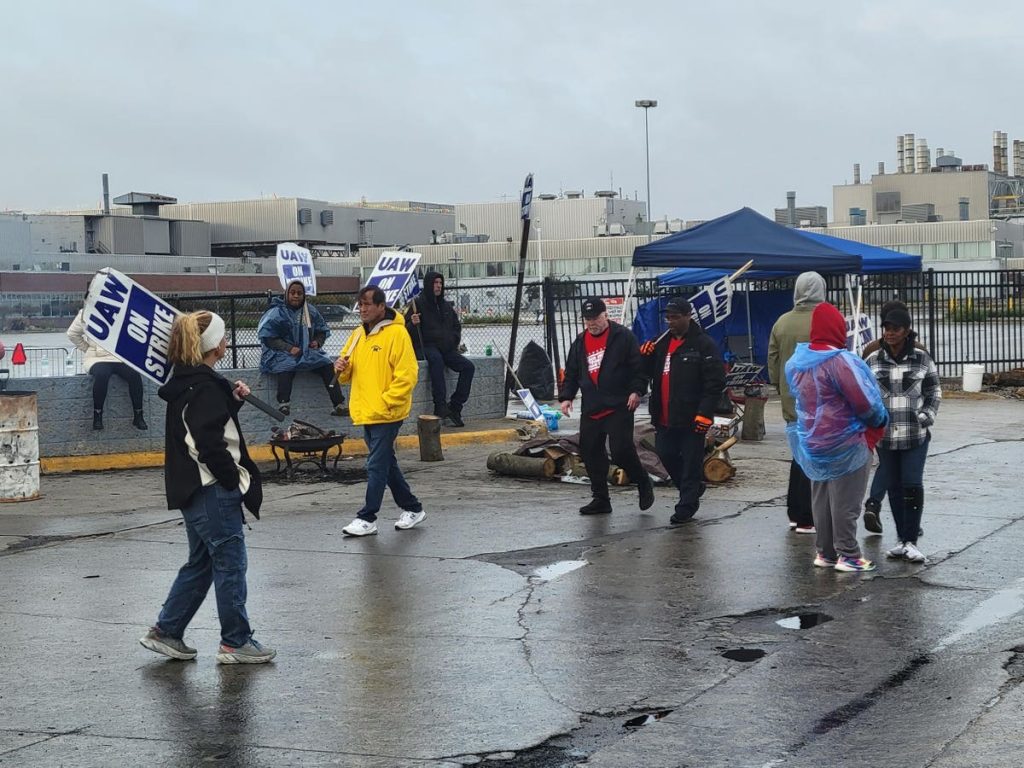On a chilly Friday as the sixth week of their walkout began, striking workers on the 6 a.m. to noon shift on the picket line at Ford Motor Company’s Michigan Assembly Plant huddled around burning barrels to keep warm. But the real heat came from their contempt for statements made in the past two weeks by top company management.
Crystal, a 29-year material handler who didn’t want to give her surname, wasn’t buying what Executive Chairman Bill Ford was selling during a speech he gave Monday. “The UAW leaders have called us the enemy in these negotiations,” Ford said in his speech. “But I will never consider our employees as enemies.”
“I believe he wants to save his family name, his family’s company. But walk the walk. You call us family,” said Crystal. “You don’t treat your family like crap.”
Hours later, UAW President Shawn Fain doubled down on that emotion, referencing the same Bill Ford statement. “The days of the UAW and Ford being a team to fight other companies are over,” Fain said. “We won’t be used in this phony competition. We will always be on the side of working people everywhere. Non-union auto workers are not the enemy.”
Four-year assembly line worker Jennifer Devers was equally angered by Kumar Galhotra, president of Ford Blue and newly appointed chief operating officer, who said last week the company was “at the limit” of what it could offer economically.
“Dig a little deeper. We’re tired of making him rich,” said Devers. “We are literally here because we take pride in what we do. We want to work and supply for our families.”
Jerome Ezell, a body stamping technician for seven years, echoed her thoughts about Galhotra’s comments. “He said the ability to invest in the future is the lifeblood of the company. We are funding that investment.”
UAW members at Michigan Assembly walked off their jobs on September 15 as part of the first group of plants in the union’s progressive “stand up” strikes, which hit all of the Detroit Three automakers simultaneously for the first time.
The following week, Fain added all 38 U.S. parts and distribution centers operated by Ford, General Motors Co. and Stellantis to the strikes.
At the GM Willow Run Distribution facility in Belleville, Michigan, a small clutch of picketers held forth at the same spot visited by President Joe Biden in September.
Truck driver and parts picker Sarah Niebauer said she’s conditionally optimistic, feeling the union was “screwed” in the contract negotiated four years ago.
“We’re standing our ground for once, but it’s scary. I’m kind of scared,” said Niebauer, who’s worked at the facility since 2016. “We’re finally standing up for what we deserve, and I think we’re going to get a pretty fair deal. It looks good to me. I think a little bit more could be done with retirement. I think I’m good with the amount, but I’m not the breadwinner in my family.”
At the end of a slim street in a light industrial park near Detroit-Metropolitan Airport sits the Stellantis-owned Mopar Romulus Parts Distribution Center. Rain sent strikers under a couple of small tents for cover, except for parts picker Scott Sooter, whose hoodie kept his head covered.
Sooter said he’s been a UAW member for 12 years and trusts the bargaining team to come through with a fair deal.
Based on what he’s read and heard, there are some parts of the company’s offer that seem favorable, but it’s not fully cooked.
“I really like the part of the contract that talks about guarantees for the temporary workers to get hired in, cutting down the progression to full time. Eight years is a long time. Also, getting rid of the pay gap between people who work at Mopar. They’re capped here at significantly less of a wage than people who work in the factories,” said Sooter. “There are a lot of good things in the contract, but they can do better.”
In three Detroit-area picket lines, morale appears to remain strong, despite workers having to live on $500 a week strike pay for the past four or five weeks.
“None of wants to be on strike and none of us wants the company to suffer,” said Sooter. “No one wants this, but it’s a long time coming. We made sacrifices in previous contracts when companies were doing poorly financially.”
At Ford’s Michigan Assembly plant, Jennifer Devers points to what’s keeping the strikers going: “Our morale. That’s our brothers and sisters out here. We’re supporting each other, standing for each other. We’re not gonna be divided.”
Two-year Ford assembly worker Jack Evans, one of the younger strikers, said he’s “making due, but we trust the process. We believe in what Shawn’s doing, trust the judgments he’s making and we’re all sticking together.”
Shawn, of course, is UAW President Shawn Fain. He’s rocked the traditional system, staging negotiations and walkouts against all of the Detroit Three automakers at the same time and employing the “stand up” strike approach, adding locations to the walkouts as he sees fit to ratchet up pressure on the automakers he doesn’t feel are bargaining in good faith.
While there are likely to be UAW members who may not agree with Fain’s tactics, none of those who spoke up on Friday were among them.
“I think they’re perfect, long overdue,” said Rick Evans, a 29-year statistical process control auditor at Ford’s Michigan Assembly Plant, of the tactics. “We should have had a Fain long ago.”
“I love the way he’s doing it. He was here with the president, and I personally told him thank you,” said Niebauer at the GM facility. “I’m glad he’s not backing down for us.”
Mopar worker Scott Sooter was a bit more tempered in his assessment, saying only, “From the little I’m aware of, I kinda like his strategy.”
But Ford worker Crystal is totally sold, enthusing, “I think his tactics caught everyone off guard. It reinvigorated what the UAW is supposed to be. I think he is a stone-cold savage.”
Read the full article here










